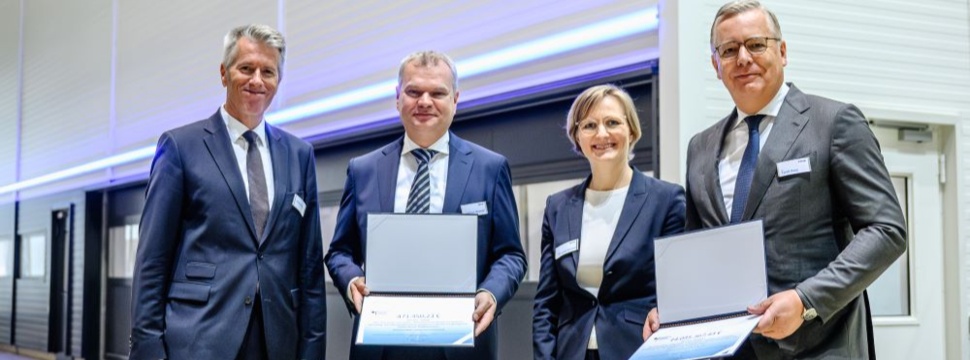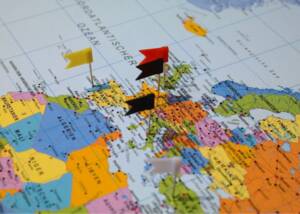Voith and Essity receive funding from the German Federal Ministry for Economic Affairs and Climate Action to research a process for sustainable paper production
News General news
- In partnership with Essity, Voith is conducting research into a groundbreaking process for CO2-neutral paper manufacturing at its Heidenheim site.
- The facility will set new benchmarks for sustainable paper production and will reduce water consumption by up to 95 percent and energy consumption by up to 40 percent.
- Dr. Franziska Brantner, Parliamentary State Secretary at the Federal Ministry for Economic Affairs and Climate Action (BMWK), gave formal notice of funding in the amount of approximately €14.5 million.

With the goal to driving the decarbonization of the paper industry with innovative solutions, Voith is working on a concept to enable CO2-neutral paper manufacturing. To drive forward the further development of this groundbreaking process, Voith has entered a partnership with Essity, a leading global hygiene and health company. To conduct further research into the completely new approach, a pilot plant was installed at Voith’s Heidenheim site that is set to commence normal operation later this year. An important milestone on this journey has now been reached: The project is to receive funding within the scope of the BMWK “Decarbonization of Industry” program and the EU’s “NextGenerationEU” fond. These initiatives are designed to permanently reduce industrial greenhouse gas emissions. The subsidy is worth approximately €14.5 million.
On May 7, 2024, at Voith’s headquarters in Heidenheim, Dr. Franziska Brantner, Parliamentary State Secretary at the BMWK, presented the official funding notice to Dr. Toralf Haag, CEO of the Voith Group, and Andreas Endters, CEO of Voith Paper. This was followed by a tour of the newly built pilot plant.
“The BMWK decided to fund the project because it makes a significant contribution to the decarbonization of the paper industry,” Dr. Brantner stressed. “This is a genuinely trailblazing project. The pilot plant is therefore sending out a powerful message for the Heidenheim location and the entire industry.”
The process that will now undergo further research with the funding from the BMWK is designed to enable a fundamentally new CO2-neutral manufacturing process thanks to a pioneering process technology. It marks a breakthrough in sustainable paper production. The new technology is targeting new benchmarks for sustainability by reducing water consumption by up to 95 percent and energy use by up to 40 percent. The entire pilot line will be 100 percent electrically powered, which allows fossil fuels to be dispensed with completely and thus facilitates climate-friendly production. Voith and Essity are combining their expertise to drive the successful realization of this project.
As well as representatives of Voith and Essity, the event also welcomed other guests: Peter Polta, District Administrator of Heidenheim; Michael Salomo, Mayor of Heidenheim; Markus Maier, President of the East Württemberg Chamber of Commerce and Industry; and Leni Breymaier, SPD member of the German Federal Parliament. State Parliamentarian Martin Grath (Alliance 90/Greens) was represented by Johannes Paus and Clara Resch who both work on his constituency team.
“The funding is a very positive signal for Voith and the entire industry. It reaffirms yet again our business strategy with its clear focus on the development of sustainable technologies,” explains Dr. Toralf Haag, CEO of the Voith Group. “With the successful commissioning of the pilot line, we have reached another milestone on our journey to CO2-neutral paper production within the scope of our sustainability initiative ‘Papermaking for Life,’” says Andreas Endters, CEO of Voith Paper. “The investments in research and development are evidence of our consistent focus on sustainable and efficient solutions.”
“As a leading global hygiene and health company, we want to drive forward the decarbonization of the paper industry,” says Magnus Groth, President and CEO of Essity. “Together with Voith, we are completely rethinking papermaking and are developing a pioneering technology that will make CO2-neutral production possible.”
Funding from the BMWK is earmarked for a specific purpose and is intended to help reduce emissions of greenhouse gases in the paper industry. It supports the achievement of the reduction target in the industrial sector in accordance with the German Climate Change Act. The subsidy of approximately €14.5 million will be paid out based on the successful progress of the project.










